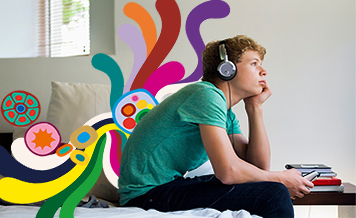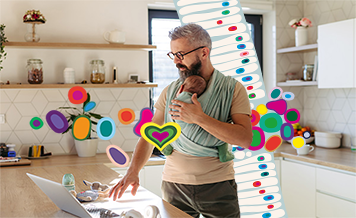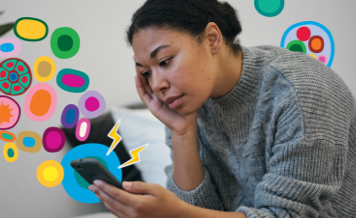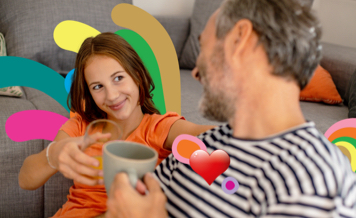Understanding depression: Symptoms, causes & support
Depression affects 1 in 7 people in Australia. Learn how to recognise the symptoms, what causes it and how to get support.
Jump to section: Causes | Symptoms | Treatment | Where to get help
What is depression?
Depression affects how a person feels, thinks and behaves. It goes beyond feeling flat or having a bad day – depression involves persistent feelings of sadness, hopelessness or worthlessness. People experiencing depression might also lose interest in the parts of their life that were once enjoyable, like a favourite hobby or seeing their family and friends.
In extreme cases, depression can make someone feel like their life is not worth living.
There are different kinds of depression, including major depression, postnatal depression and bipolar disorder.
Fortunately, depression is treatable and there are many support options and services available to help.
Here, we look at the causes, symptoms and support options for depression.

Depression in children
Worried your child may be experiencing depression? Know the signs to look for, how to help, and where to get support.

Depression in teenagers
Depression affects 1 in 4 young people in Australia. Know what to look out for, what you can do and where to get help for teenagers experiencing depression.

Postnatal Depression
Postnatal depression affects women and men and, left untreated, can last years. Know the symptoms and know how to get help.
What causes depression?
Like many mental health conditions, depression can have more than one cause. Sometimes depression is brought on by a life event like a trauma or a loss; other times, biological factors like genetics and personality traits can play a role. Often, depression will develop due to a combination of factors.
Regardless of the cause, it’s important to take depression seriously if you or someone you care about are experiencing symptoms.
Signs and symptoms of depression
Everyone experiences depression differently, however common symptoms of depression include:
irritability
lack of motivation
feeling sad, guilty or overwhelmed
negative thinking
changes to sleep
feeling extremely tired or run down
aches and pains
changes to appetite or weight
withdrawing from people and activities you used to enjoy
If you’ve had any of these symptoms for two weeks or more, or you’ve noticed them in someone you care about, see your GP or a mental health professional for support.

Treatments for depression
It’s important to know that depression is treatable with the right support. There’s no one size fits all approach — the right treatment for you depends on the type of depression you have, how severe your depression is, and your personal preference for treatment.
Some options for treatment might include:
lifestyle changes, such as changes to diet and exercise
therapy
medication, such as antidepressants.
Talk to your doctor or mental health professional to decide on a treatment plan that works for you, and be sure to discuss any issues with them along the way.
How lifestyle changes can help
Many of the same lifestyle changes that will improve your physical health can also improve your mental health. Exercise, diet and sleep all play a key role in your mental wellbeing, but when you are feeling low, overwhelmed, stressed or anxious, a healthy lifestyle is often among the first things to suffer.
Exercise to improve wellbeing
In combination with your prescribed treatment plan, regular exercise may help you manage stress and improve your sleep, and it may also lift your mood and reduce anxiety.
Because depression can affect your motivation to get active, start with simple exercises that you enjoy, or ask a friend to join you. Pace yourself and slowly build up to more activity.
Eat for your mental health
Eating nutritious and healthy meals can help boost your energy, which is especially important when you already feel flat. Look to eat more vegetables, fruit, nuts, legumes and eggs, while eating less foods and drinks that are high in sugar or that are highly processed foods. These foods have been linked to an increased risk of depression. You can also consider limiting or skipping caffeine, alcohol and other drugs as these can make symptoms worse.
Prioritise a good night’s sleep
Getting enough sleep is important for your mental health as it can boost your mood and your ability to cope with stress. Unfortunately, depression often disrupts sleep. Limiting screen time before bed, reducing caffeine and alcohol, and sticking to a regular sleep schedule are all things you can do to help try and improve your sleep quality.
Find ways to manage stress
Stress is a common symptom of depression. You can try to manage stress and improve your ability to cope by finding relaxation techniques or activities that work for you. For some people, exercising or getting physically active can help, while others might like to try deep breathing or a guided meditation. Mindful activities like drawing, cooking or gardening might also work for you.
Cut back on drinking and drugs
People sometimes use alcohol or drugs to cope when they’re feeling down, but these can make your symptoms worse. Alcohol and drugs can also interact with medicines for anxiety and depression and reduce their effectiveness or increase the chance of side effects.

24/7 Medibank Mental Health Support
Medibank health insurance members can chat to a mental health professional about how they feel and ask questions about a range of mental health concerns for themselves or a loved one and get guidance on what they can do next. Chat online or call 1800 644 325 anytime of the day or night, 7 days a week at no extra cost.~
How to support someone experiencing depression
If someone you care about is experiencing depression, let them know you’re there. Listen without judgment and encourage them to get support from a doctor or mental health professional. Depression can make daily tasks feel overwhelming, so small acts — like checking in or helping with practical things — can really help. Learn about depression to better understand what they’re facing. And don’t forget your own wellbeing — supporting someone else is easier when you’re also looking after yourself.
Where to go for help
If your life or someone else’s is in danger, call 000 immediately.
If you’re in distress and need help, call Lifeline on 13 11 14 for 24/7 crisis support.
For non-emergency support, your GP or regular health practitioner is often the best place to start. They will be able to assess your individual situation and recommend the best next steps for your recovery.
Medibank health insurance members can chat to a mental health professional about how they feel and ask questions about a range of mental health concerns for themselves or a loved one and get guidance on what they can do next. Chat online or call 1800 644 325 anytime of the day or night, 7 days a week at no extra cost.~
If you have been diagnosed with treatment resistant depression and would like to learn about an innovative psychotherapy program Medibank is funding for eligible Medibank members with treatment resistant depression, call 1300 733 338. Participation will not be suitable for everyone and clinical approval from your current GP or psychiatrist will be required. The program is currently only available in Perth and Brisbane.
Remember that help is always available, no matter the situation.
How can we help?
I want to know how my cover supports mental health
I need help and want to talk
Related articles
Things you need to know
~ Some referred services may involve out of pocket costs and waiting periods may apply.
While we hope you find this information helpful, please note that it is general in nature. It is not health advice, and is not tailored to meet your individual health needs. You should always consult a trusted health professional before making decisions about your health care. While we have prepared the information carefully, we can’t guarantee that it is accurate, complete or up-to-date. And while we may mention goods or services provided by others, we aren’t specifically endorsing them and can’t accept responsibility for them. For these reasons we are unable to accept responsibility for any loss that may be sustained from acting on this information (subject to applicable consumer guarantees).
.png)









